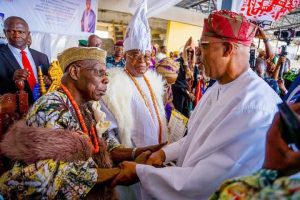The Boko Haram We Knew Disappeared And Merged Into Bigger Threat – Garba Shehu

The Special Adviser to the President on Media and Publicity, Garba Shehu, has lamented over the spate of attacks by Boko Haram, saying the terrorists have disappeared and merged into a bigger threat.
Boko Haram launched series of attacks in the northeast in 2009 after its leader, Mohammed Yusuf, who was captured by the military authorities died in police custody.
In 2014, the group pledged its allegiance to the Islamic State of West African Province (ISWAP) and has targeted military formations, civilians, religious centers among others.
But Shehu, who spoke during an interview on Channels Television’s Sunday Politics, said ISWAP is being funded by the remnants of the Libyan Army in collaboration with Iraq and Iran.
“What we are seeing today is that the Boko Haram that we knew has virtually disappeared and has merged to a bigger threat – ISWAP that is funded and financed by the Libyan Army and alliances that have been formed including Iraq,” he said
“This is a challenge not only to Nigeria, Lake Chad Basin but to the Sub-Saharan region, and the whole of West Africa is tackling this together.”
When asked if Nigeria is in a safer place to live in before President Muhammadu Buhari’s administration, the Presidential spokesman replied in the positive.
Shehu said since his principal was inaugurated as President in 2015, he has taken adequate measures in tackling several threats, including the farmers/herders clashes.
He stated that with respect to banditry activities, the south-western region of the country is the safest part so far.
Nigeria has been experiencing a series of security threats ranging from terrorism, banditry, militancy, cultism among others in several parts of the country.
The country has been battling terrorism for more than a decade which has killed at least 36,000 people and displaced hundreds of thousands in the northeast.
The Islamic State of West African Province (ISWAP) split from the jihadist group Boko Haram in 2016 and has since become a dominant threat in Nigeria, attacking troops and bases while killing and kidnapping passengers at checkpoints.
On March 1, jihadist fighters burnt down a United Nations humanitarian compound in the town of Dikwa after dislodging troops, killing six civilians.
Nigeria’s jihadist violence has spread to neighbouring Chad, Cameroon, and Niger, prompting a regional military coalition to fight the insurgents.







